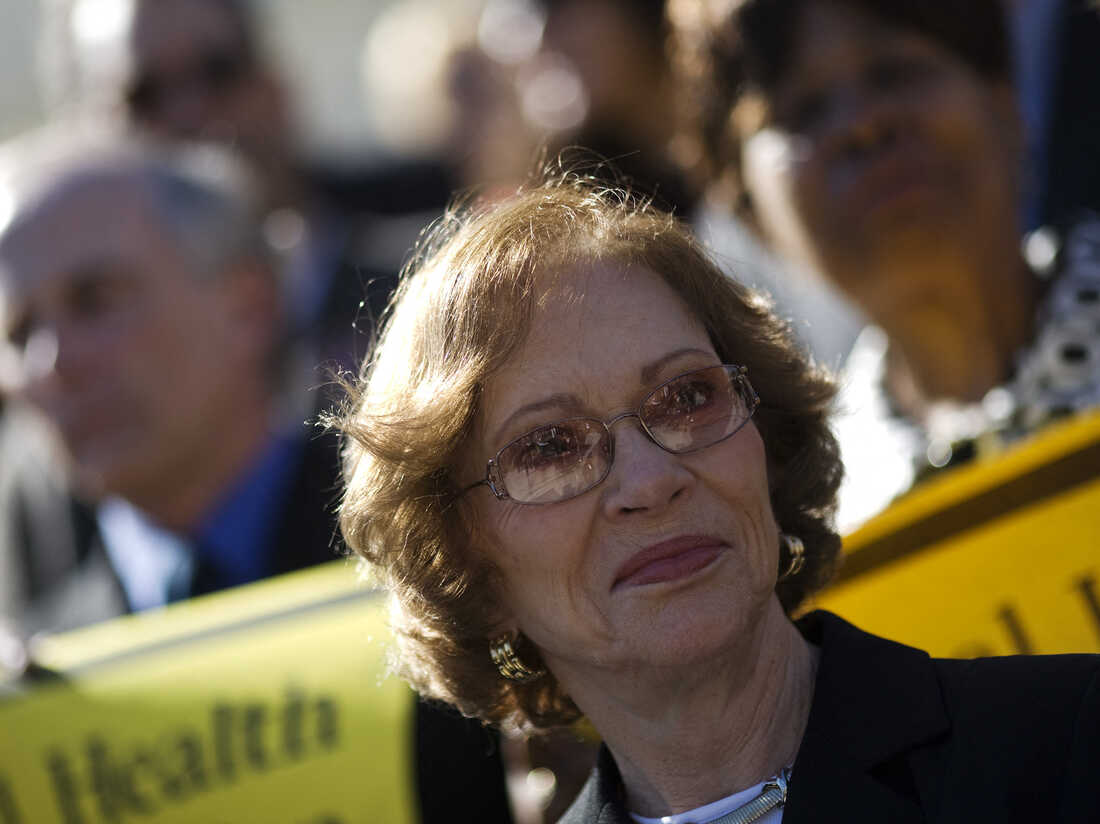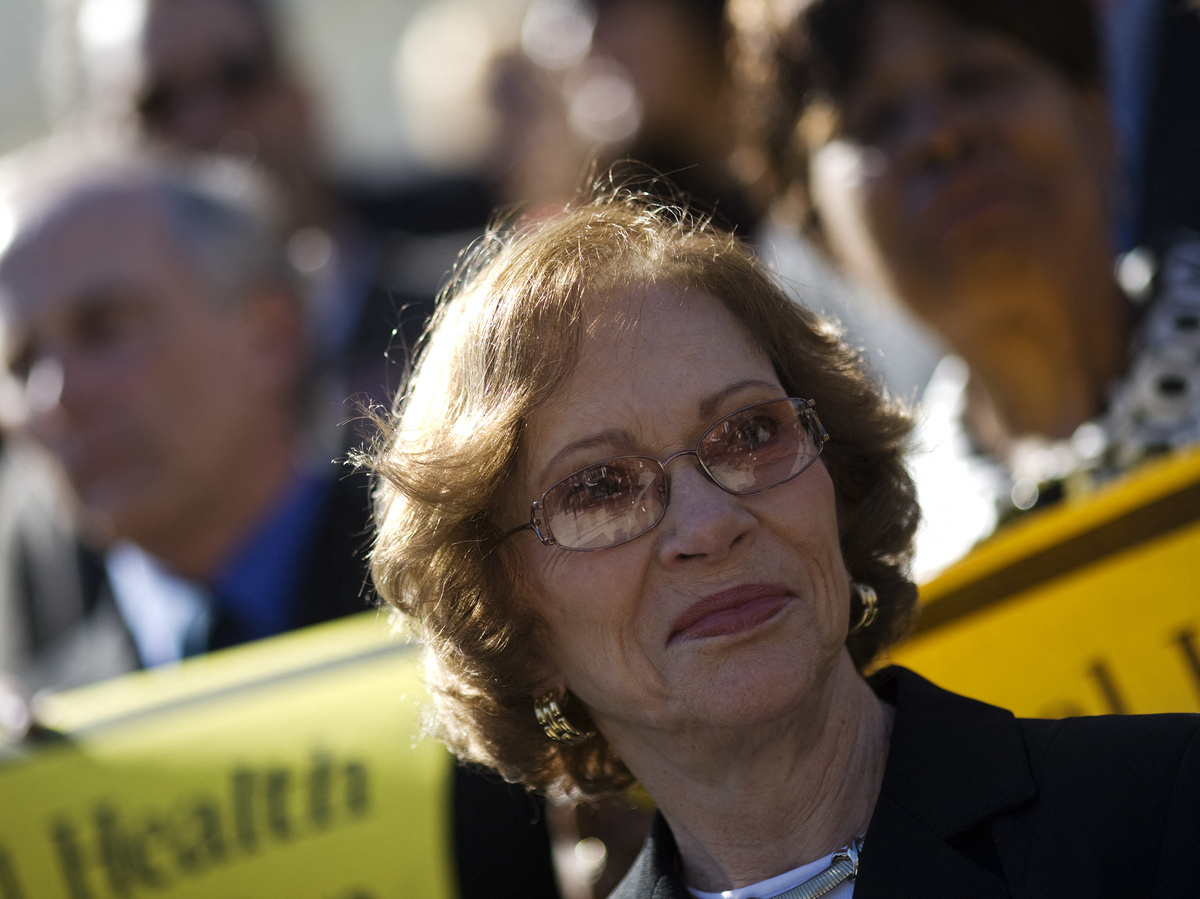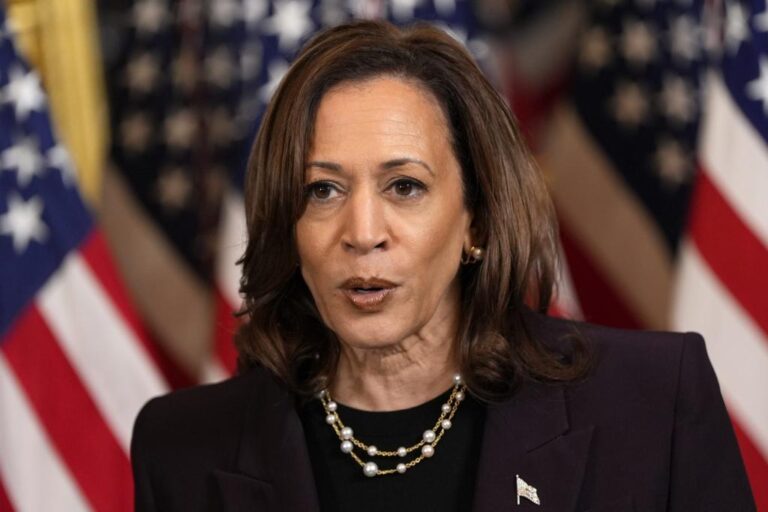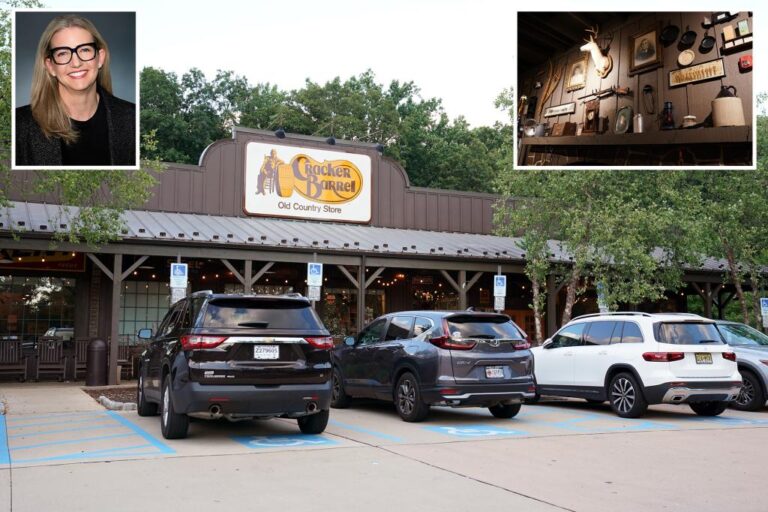
Former First Girl Rosalynn Carter attends a rally on the US Capitol in March 2008 when she helped get the psychological well being parity regulation enacted. Carter died on Nov. 19 at age 96.
MANDEL NGAN/AFP by way of Getty Photographs
cover caption
toggle caption
MANDEL NGAN/AFP by way of Getty Photographs

Former First Girl Rosalynn Carter attends a rally on the US Capitol in March 2008 when she helped get the psychological well being parity regulation enacted. Carter died on Nov. 19 at age 96.
MANDEL NGAN/AFP by way of Getty Photographs
Former First Girl Rosalynn Carter championed many causes throughout her lifetime. However she held a particular place in her coronary heart for psychological well being.
Carter, who died on Sunday at age 96, used her platform to sound the alarm in regards to the inadequacies of the nation’s psychological well being system.
“She was in it approach earlier than anybody else, and she or he actually used her place as first woman to advance the entire reason for these with psychological sickness,” says former Rep. Patrick Kennedy (D-Rhode Island).
Rosalynn Carter’s curiosity in psychological well being dated again to her husband’s run for governor of Georgia. On the marketing campaign path, members of the family of individuals with psychological sickness would inform her in hushed tones how tough issues had been. Half a century in the past, individuals had been ashamed to speak about psychological sickness, however Carter didn’t shrink back.
“She imagined that we might have psychological well being remedy, simply the identical approach that folks had been going to the docs for his or her bodily well being,” says Dr. Rebecca Brendel, a past-president of the American Psychiatric Affiliation.
The landmark Psychological Well being Techniques Act of 1980, which Carter championed whereas President Jimmy Carter was in workplace, was a recreation changer, Brendel says. It referred to as for main investments in community-based psychological well being remedy.
The measure handed however would later be stripped of funding after President Reagan took workplace within the ’80s.
“If we had adopted Mrs. Carter’s lead, from the time that she started advocating for the supply of psychological well being [services], we might be in a really totally different place than we’re, actually taking part in catch up in making psychological well being providers accessible to each American,” Brendel says.
Regardless of the setback, Rosalynn Carter endured.
Although the nation’s psychological well being system nonetheless falls quick in myriad methods, Carter did not surrender on the concept that it could possibly be higher. She titled her 2010 e-book on the difficulty Inside Our Attain, as a result of she believed the issues could possibly be solved.
Eve Byrd, director of the Carter Middle’s psychological well being program, says Carter lately would inform tales about her struggles getting policymakers to interact on the difficulty.
“She stated, ‘I used to be first woman and you wouldn’t consider how tough it was to get individuals to come back and speak about these providers, these wants and this difficulty,’” Byrd says. “She was persistent and labored very laborious to get individuals to speak about it. What units her aside is that she acknowledged the stigma, and actually extra so the discriminatory behaviors that come from that stigma.”
It will be one other three a long time earlier than neighborhood psychological well being remedy could be federally funded once more, by way of the Inexpensive Care Act, which was signed into regulation by President Barack Obama in 2010.
Earlier than the ACA, Rosalynn Carter lobbied for one more federal invoice: the 2008 Psychological Well being Parity and Habit Fairness Act.
The measure, co-sponsored by Kennedy, would require insurance coverage firms to cowl psychological sickness on par with different medical points.
Kennedy says the Parity Act handed partially as a result of it obtained tacked onto the $700 billion bailout for banks aimed toward stabilizing the financial system; but additionally as a result of it obtained an enormous enhance from Carter, who got here to Capitol Hill to testify in assist of the measure.
“Mrs. Carter was key,” Kennedy says. “I do not assume we handed it as a result of there was any nice outcry to lastly finish the separate and unequal remedy of those that have a mind sickness versus one other sickness of their physique. There was simply actually not a complete lot of different individuals coming in with any type of movie star in any respect desirous to affiliate themselves with this trigger.”
Quick ahead to 2023, and there are quite a few examples of how Carter’s persistent work, over so a few years, has born fruit.
Earlier this yr, the Biden administration strengthened a rule to make insurance coverage cowl psychological well being care.
Dr. Brendel with the American Psychiatric Affiliation says Carter’s efforts additionally helped spur federal funding for analysis on psychological sicknesses.
There’s additionally the brand new nationwide three-digit psychological well being disaster line, 988, she says, which “parallels emergency medical providers, and might put any American and each American in contact with a educated disaster counselor once they’re experiencing any type of psychological well being disaster or emergency.”
And Carter’s psychological well being work was not restricted to the U.S. Within the early 2000s, she centered on Liberia, the place the psychological well being workforce was basically non-existent.
“We have been in Liberia for 15 years,” says Byrd. “[We’ve] gone from one psychiatrist to over 350 clinicians… helped them cross their first psychological well being regulation.”
Carter additionally understood the ability that the media has in shaping public notion. For thus lengthy, dangerous depictions of individuals with psychological sickness in films and information protection perpetuated stereotypes and fueled stigma and discrimination.
To assist counter these adverse impacts, the Carter Middle established the Rosalynn Carter Fellowships for Psychological Well being Journalism. Since 1996, tons of of Carter Fellows, myself included, have been educated in dismantle stigma by way of storytelling and report on psychological well being precisely and with compassion.

Kennedy, who went on to discovered the psychological well being advocacy group the Kennedy Discussion board, says he got here to the Carter Middle in Atlanta on quite a few events to talk with Carter Fellows.
“It is not a really romantic type of legacy to say how you are going to prepare reporters to write down about these items,” Kennedy says. “But when you concentrate on it, it had profound implications by way of coverage in the direction of psychological well being, if reporters can actually write about it in a approach that educates individuals. And boy, what an impression that has for the entire area.”
Rosalynn Carter’s power was her “dogged persistence,” Kennedy says. “She undoubtedly was one for the ages, as a result of she was round all through. It wasn’t only a transient interval the place she lent her identify. She was in it to win it, as we wish to say.”
Byrd attributes Carter’s persistence to her religion and dedication to residing her life in service to society.
“Additionally, in working with the neighborhood of individuals with lived expertise, she noticed exceptional transformation and success when individuals obtained the therapies and helps that they wanted,” Byrd says. “That instilled nice hope for her.”
Brendel says she’s grateful to Rosalynn Carter for being an instance of compassion and dedication for anybody who hopes to result in lasting change.
“We have now to keep it up, it would not occur in a single day,” Brendel says. “Her legacy will at all times be that she caught with it proper till the tip… and her legacy will reside on with all of us.”
Christine Herman is a journalist based mostly in Champaign, Illinois, and a 2018-19 Rosalynn Carter Psychological Well being Journalism Fellow.






















